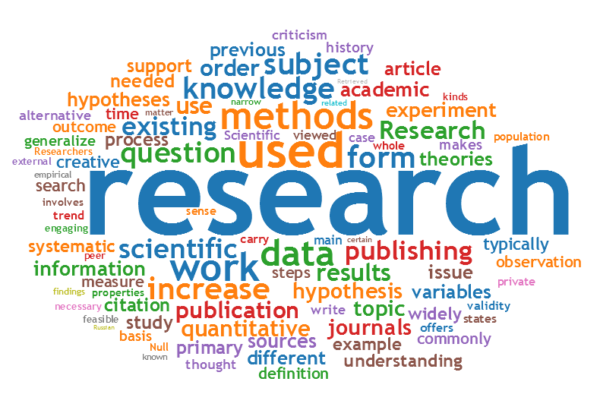Research is a systematic way of investigation into and study of materials, sources, concepts and theories in order to establish facts and reaching new conclusions. According to Westerns Sydney University’s definition of research in the context of social and economic sciences, “Research is defined as the creation of new knowledge and/or the use of existing knowledge in a new and creative way so as to generate new concepts, methodologies and understandings. This could include synthesis and analysis of previous research to the extent that it leads to new and creative outcomes.” Research may involve the analysis and integration of previous research to the extent that it leads new outcome. Therefore, the essence of research is based on innovation and invention.
Types of Research
In social and economic sciences, there is no universal consensus about main categories of the scientific research, however, depending upon the context, aim and objectives of the research questions, we can divide research into 4 main categories:
- Descriptive Vs Analytical
- Applied Vs Fundamental
- Quantitative VS Qualitative
- Conceptual Vs Empirical
Check out Thematic Analysis for Qualitative Research
The following section defines each type of research:
Descriptive Vs Analytical Research
Descriptive research is research method used to describe the characteristics of the population or phenomenon under study which focuses on “What” rather than “why”. Examples of descriptive research are social and economic surveys conducted by different research organizations United States Census Bureau, European Research Infrastructure Consortium (ESS ERIC) or research departments in universities and research institutes conducting longitudinal, comparative, correlational or normative research on different social and economic research topics
On the other hand, in analytical research, researchers use existing facts and figures to reach to a critical evaluation or conclusion. Analytical research mainly focuses on “How” and Why” aspects of the research questions. Analytical research may use data collected through descriptive research to arrive on certain conclusions. For example, researchers may search to find out the main root-cause of loneliness in older people in European countries using survey data collected by European Social Survey team or researchers may arrive at the conclusion of why there is an increasing rate of adolescent crime or gang violence using survey data collected by US census Bureau.
Check Out What is Sampling?
Applied Vs Fundamental
Researchers use applied research to answer real-life problems. For example, researchers aim to increase the production of the wheat crop in far north American territories. Therefore, they will utilize applied research by producing different gene varieties of wheat that can resist the environment and temperature and yield high production.
Fundamental research aims to answer basic questions which are general in nature and may or may not have immediate practical application. Basic or fundamental research expands the horizon of established scientific theories and expand knowledge of natural and other phenomena. Examples of basic research are exploring causes of greenhouse effect and its impact on climate change, observing the migration patterns of population due to social and economic factors from one region to another.
Quantitative Vs Qualitative
Both qualitative and quantitative research is all about collecting data, however for each type, the data collection method and type of data collected are different. Quantitative research requires compiling numerical data to analyse causal relationships among different variables. Data collection methods used for quantitative research are experiments, questionnaires, surveys and database reports. Quantitative research focuses on “What” and “How” for answering research questions related to phenomenon, concept or idea.
Qualitative research is based on gathering and interpreting non-numerical data. Some of the data collection methods used for qualitative research are interviews, focus group studies, documents, personal diaries or journals and observation. Qualitative research often focus on finding “Why” behind a phenomenon, concept or idea.
Conceptual Vs Empirical
Conceptual research is based on creating new concepts based on interpret existing concepts. Researchers use it to propose new theories or conceptual frameworks based on existing literature in research. Researchers build theoretical frameworks to propose new research proposals based on existing theories. Data collected during conceptual research comes from researcher’s direct observation of a phenomenon or derived through interpreting theories and concepts proposed and researched by the fellow researchers. However, it is imperative to mention here that it is always recommended to provide due credits to the researchers whose research is quoted or evaluated during conceptual research process. This is termed as citation and referencing.
Empirical research is based on verifiable observations or experiences rather than theory or pure logic. It arrives at conclusions supported by empirical evidences. Empirical research cycle is based on different steps including observation, induction, deduction, testing and evaluation.
